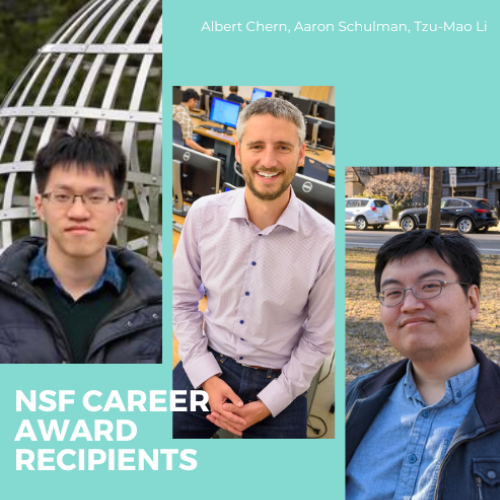CSE’S CAREER AWARD RECIPIENT LIST GROWS BY THREE – AGAIN
By Kimberley Clementi
For the second consecutive year, three faculty members from UC San Diego’s Computer Science and Engineering (CSE) department were recognized with the National Science Foundation’s Faculty Early Career Development (CAREER) award. Assistant professors Albert Chern, Tzu-Mao Li and Aaron Schulman were among those to receive this year’s award, joining an impressive 43 CSE colleagues honored in previous years.

The Faculty Early Career Development (CAREER) Program offers NSF’s most prestigious award to support early-career faculty who have the potential to serve as academic role models in research and education and to lead advances in the mission of their department or organization. The program provides grants to support solutions-oriented research in science and engineering.
CSE assistant professors Taylor Berg-Kirkpatrick, Ndapa Nakashole and Rose Yu were 2022 CAREER award recipients, receiving grants to research in the areas of language and artificial intelligence, machine reading in healthcare and spatiotemporal data analysis. The latest grants will support research in physical simulations, visual computing and wireless security.
A Different Angle on Physical Simulations
NSF has earmarked funding for Albert Chern’s research on the topic Geometric Approaches to Simulation. Chern, who earned his PhD in computational mathematics from CalTec before joining CSE in 2020, combines both fields to examine the computational aspects of differential geometry.
With this project, Chern aims to address two fundamental challenges in physical simulations: simulating vortex-dominated fluids, and solving partial differential equations on infinite domains. While many simulations take place in a flat Euclidean space, Chern studies simulations from a different angle – one that leverages advanced geometric mechanics.
Bridging Machine Learning and Classical Visual Computing
Research funded by Tzu-Mao Li’s CAREER award for Differentiable Programming For Visual Computing could enable self-driving cars to make better decisions. Or it could train robots to use physical information to interact with their environment. It could even lead to more realistic virtual worlds, superior cinematic film shots, and improved building design with better lighting and functionality.
Li, who joined CSE in 2021 and is affiliated with the Center for Visual Computing, sees broad applications for his mathematical approach to processing visual data. Existing methods have notable limitations. Deep neural networks, a modern machine learning method, do not model the underlying physical process and are difficult to debug and control; classical visual computing algorithms don’t learn and have narrow applications. Li’s synergistic plan accounts for the strengths and weaknesses of each.
Wireless Defenses for Critical Infrastructure
Aaron Schulman, an assistant professor in CSE since 2016 and a member of the Systems and Networking group, received a CAREER award to support his research on the topic: “Protecting Critical Infrastructure Against Wireless Attacks.”
Schulman explains just how pervasive wireless communication has become within modern critical infrastructure, allowing operators to connect and monitor everything from configurable speed signs and aviation fuel trucks to city-wide water valves and circuit breakers on the power grid. Despite obvious benefits, wireless access has created a new vector for attackers.
Schulman’s project is a multi-pronged effort to remedy these potential threats. It seeds a new class of security principles and cyber-defenses – such as universal wireless scanning and wireless fingerprinting – designed specifically to protect critical infrastructure.
